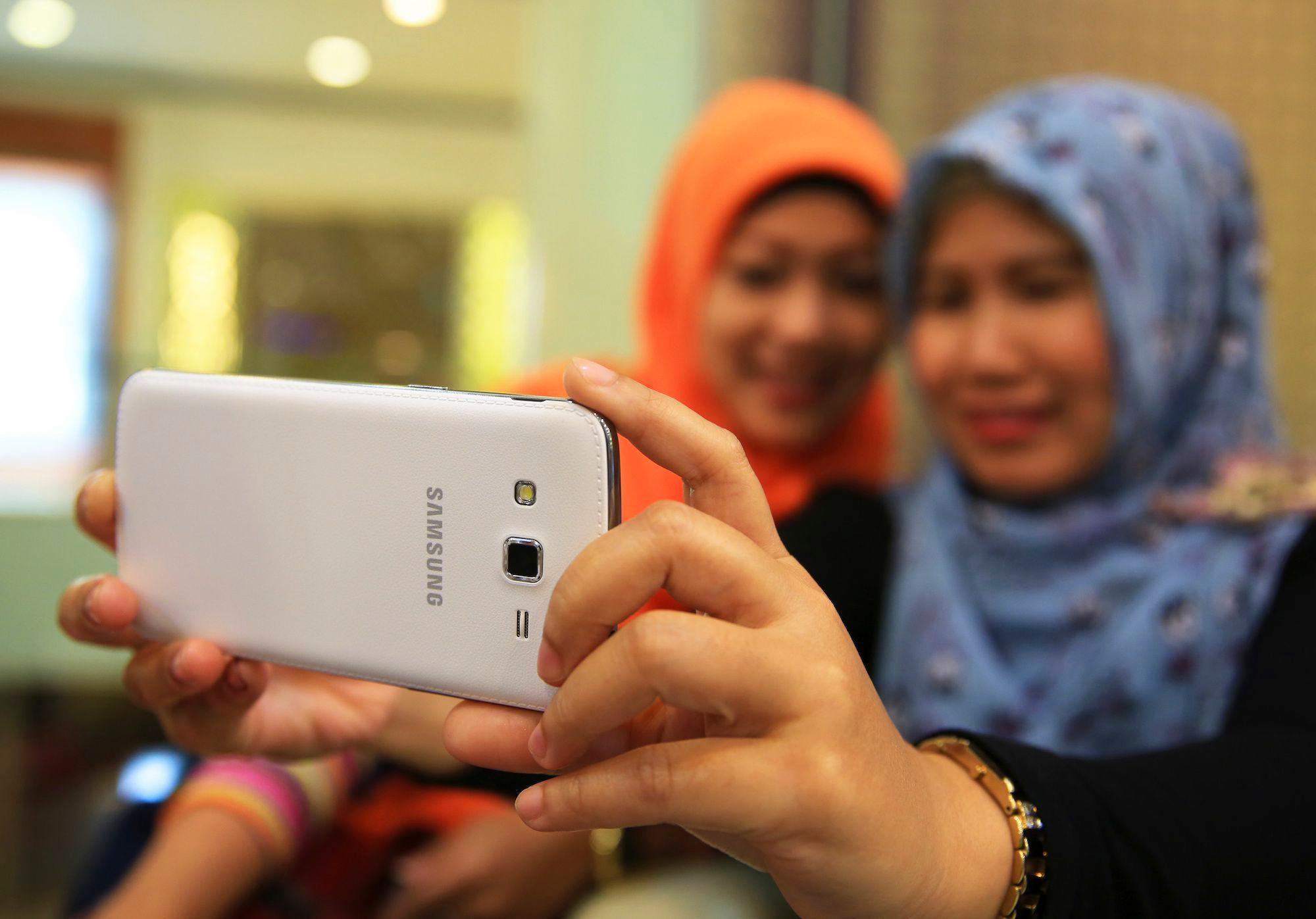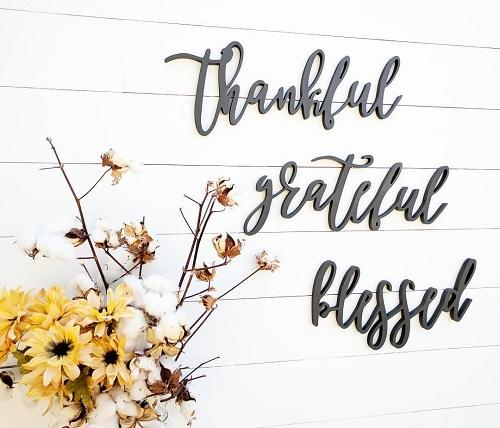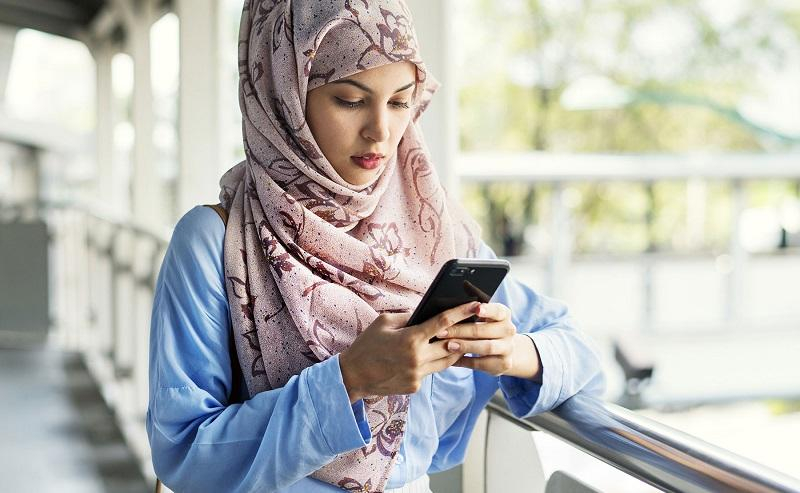Blessed Vs. Grateful? Why Your Words Matter on Social Media
Lifestyle
|
Nov 20, 2019
|
7 MIN READ

By Nargis Rahman
"Blessed" and "grateful" are terms used interchangeably on social media. However, a recent Instagram poll I conducted (@nargisthewriter) uncovered that these terms have a lot more impact on our subconscious than we may think in ways we may not initially even realize.
Recently I was talking to my friend JoAnne Halaweh, a clinical social worker, about these terms. She said she noticed a trend of people using the term “blessed” to share posts about their lavish vacations or fashion choices, which implies they are deserving of something, rather than using the term “grateful,” which is reflective of the blessings given to one. We both agreed that we need to explore this further and find better ways to say what we mean and what we don’t.

Image source: Twitter and Reuters
JoAnne said the misuse of the word "blessed" is problematic because it makes the reader feel like they are not deserving and are less than. However, acknowledging the wonders of the world is a blessing that Allah (S) has placed for us to beautify our experience on Earth. So, a more appropriate caption [instead of just saying one is blessed] would look something like this: “I am grateful for the opportunity to take this trip; it is a blessing to see the beauty in the world.’”
According to The New York Times, the term “blessed” became popular in 2014 as a way to humblebrag about God-given gifts, or what JoAnne describes as things others cannot usually attain through hard work alone. It is a term made popular in mainstream by celebrity culture and often living a privileged life, which is then promoted on social media platforms.
In Islam we are encouraged to check our intentions. The Prophet Muhammad (saw) said, “Actions are but by intentions, and every person will only get what he intended. (Bukhari)
We are also told to avoid arrogance, boasting of our good deeds and remain humble.
The Prophet Muhammad (saw) said:
“There are three (types of) people to whom Allah will neither speak on the Day of Resurrection nor look at them nor purify them, and they will have a painful chastisement.” The Messenger of Allah (saw) repeated it three times. Abu Dharr (May Allah be pleased with him) remarked: “They are ruined. Who are they, O Messenger of Allah?” Upon this, the Messenger of Allah (saw) said, “One who lets down his lower garments (below his ankles) out of arrogance, one who boasts of his favours done to another; and who sells his goods by taking a false oath.” (Muslim)
However, we are encouraged to celebrate the praises of our Lord and show gratefulness.
Writer Nancy France writes that the term “blessed” is a biblical word that in Bible terms are for those who endured hardships. Therefore, in the way it’s currently and most often being used is incorrect. Nancy writes that preachers like Joel Olstein made being blessed a cool thing on television.
People often use the words interchangeably, although the meanings can be left up to interpretation, says Tabtila Chowdhury, a second-year medical student at Michigan State University College of Osteopathic Medicine. “Someone may post about their child being their biggest blessing in life whereas others may feel their career is. Different blessings are attained by different people yet still holds the same value to the individuals.”
She says she uses her account to document her life. “I consider compassion when posting because I don't use my account to flaunt my life for anyone's favor. I simply use my account as a diary to document my travels and adventures and often find myself looking through my own feed to relive memories. Uncompassionate postings involve an unhealthy desire to boast or portray an image of perfection as opposed to reality.”
Consider the following post on Instagram, in which the writer discusses her gratitude in a compassionate manner.
View this post on Instagram@bushraxo • Medical student • Detroit, MI • “Ever since I was really young, I’ve always had a strong passion for medicine. I just couldn’t see myself doing anything else. I’m a Bengali girl from a small, low-income pocket of Detroit, where being a physician was all but hopes and dreams. Now, every day I have to pinch myself because I can’t believe God let me have this opportunity. And that he gave me the privilege of a lifetime—to take care of other human beings to the best of my ability. I’m so grateful knowing how hard I’ve worked to be here. I’m willing to work even harder every day to be deserving of this position. The foundation that I am building my career on is nurtured by resilience, passion, and a lot of prayer.” • Are you a Muslim that is working, training, or studying in a health profession? DM us your story! • #muslimsinmedicine #muslimdoc #muslimdocs #muslimwhitecoat #mashallah #allahuakbar #subhanallah #musliminspo #doctor #medicine #motivation #medicalschool #medschool #residency #nursing #nursingschool #rn #np #pa #dentist #dentalschool #therapy #psychiatry #psychology #pt #ot #rt #muslimgirl #themuslimgentA post shared by Muslims in Medicine (@muslims.in.medicine) on Nov 18, 2019 at 12:00pm PST
What's Your Intention in Using "Blessed" Vs. "Grateful"?
How are people using and thinking about using these two terms: "blessed" vs. "grateful"? The Instagram poll I conducted gave me some interesting insights.
Based on my poll, about 22 percent believed people’s blessings were because they were rich while 78 percent of those who voted thought the person had worked hard (for that blessing). Similarly, 27 percent of people thought blessed defined privilege, while 73 percent thought it defined someone being grateful.
Another interesting sight from the poll was this: Voters reported that when they used the term themselves, 33 percent said they referred to a blessing while 67 percent were referring to being grateful. So, what does all this mean? Are we muddling up the meaning of these words in how we are using them?

Therapist Sumayyah Taufique says it all comes down to intention and considering what values we are perpetuating online. “Social media needs to be intentional. Let’s pause and think about ourselves. What am I hoping to gain from this post?” For example, she asks, are we seeking validation? “What we are struggling with internally is leading to a behavior externally,” she says. “What we post online should align with our values and emotional boundaries.”
Sumayyah says there are positive elements of social media, such as community building and education, and that it’s okay to post about things using the word blessed, as long as we do the internal work of intention behind the post, presenting a balanced view and showing the behind the scenes work when we are able.
JoAnne says our lifestyles, and what we share about it, come with responsibilities. “In Islam, we believe that we are being tested regardless of our circumstance. The poor are expected to show trust and patience in Allah’s will, and the rich are to be humble and charitable and to use their status and fortunes to lift the community. With any circumstance comes responsibility.”
This also applies to how we consume social media, says Sumayyah. She says to consider the following questions: Why are we going to certain accounts? What are we gaining from those accounts? Do those accounts add value to my life?
According to Bustle.com, social media can impact the way you think, sometimes positively by improving memory of certain events and activating the brain’s reward center, while also negatively impacting your need for validation and likes or reducing attention span. Time found that although memories were improved online, people spent less time processing those memories in real-time, “the act of externalizing their experience – that is, reproducing it in any form – that seemed to make them lose something of the original experience.”
Why Words and Hashtags Matter
The way we say things online affects how we process information. JoAnne says defining terms are important. “Gratitude is acknowledging your appreciation of something in your life, while a blessing is rooted in religion and implies that God has orchestrated the life circumstance,” she says.
JoAnne adds that using the term "grateful" can encourage reflective thinking. “It can shift the thought process of the reader to consider what they are grateful for, rather than focusing on the differences and fortunes the post is showing when using words like 'blessed.'”
Allah (S) says, "If you were to count God's favors, you would not be able to number them; most surely humanity is very unjust, very ungrateful. (Quran 14:34)" Also, Allah (S) says that if we are grateful, He will give us more. "If you are grateful, I will surely give you more and more. (Ibrahim 14:7)"
Sumayyah says that unless we don’t examine the words carefully, gratitude can also be conditioned as a negative word in our brain. She says, “In Muslim settings (we are told to) be grateful. If you’re throwing it at me when I’m at a really bad place ... it’s used as a weapon to silence pain versus uses as a lens to life.”
This may have developed from situations of a comparison narrative, such as when children are compared to others and told they are “not good enough,” Sumayyah says, adding that this can manifest into jealousy stemming from a scarcity mindset. Comparison narrative makes us feel that someone is living better than we are, based on the filtered “best version” we see on social media. Sumayyah, who works with Muslim women, says this is the biggest trend she’s seen when it comes to the impact of social media use.

Image source: Wisconsin Muslim Journal
“It’s a challenging place to get stuck. Especially when we’ve already been compared to our siblings or aunties kids [and we’ve] internalized that voice from a younger age. [We also then experience] fear of missing out (FOMO),” she says.
Sumayyah suggests to pause and work on one’s own measuring stick and definition of success.
“What do you define as success? Beauty? Happy family? A life that you want to live. The work is constantly where you are at, what is meaningful to you. How can you turn down the volume of [comparing yourself to] other people?”
She says we can be mindful of how we approach social media as well. “I can choose to not consume people’s lives and choose not to add to that. [When] certain things [happen in my life], do I feel blessed? Grateful? [Should I] share on a public platform? Maybe not. [Maybe I should] share on private platform.”
Language and framing words online affects the way we use and consume social media. When it comes to our own experiences, achievements and possessions, each of us must examine our intentions, purpose and values based on our own measures for success when posting privately and publicly online. Therefore, when choosing between sharing about being blessed and/or grateful, consider what word really reflects what you want to say and the deeper implications of those words and hashtags.
There is joy and beauty to be shared publicly and privately, and we can all benefit from sharing Allah’s (S) blessings and our gratitude for them. But the words we choose matter more than we may ever realize.
Subscribe to be the first to know about new product releases, styling ideas and more.
What products are you interested in?

